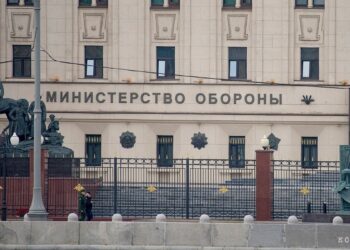Military censorship in English
A British “non-governmental” committee led by officials from the Ministry of Defense, the Ministry of Internal Affairs and the Ministry of Foreign Affairs is trying to control not only the media, but also social networks
Original of this material
© PoliticoBelgium, 02/27/2024, Translation via deepl.comUS tech giants refuse to work with Britain’s top-secret military censorship board
Laurie Clark (Laurie Clarke) Tamlyn Magee (Tamlin Magee)
The British Media Censorship Board is trying to win over the world’s leading technology companies. But the Silicon Valley giants are simply not interested.
Companies like Google, Meta And Xhave repeatedly rejected Britain’s secret committee in its mission to prevent the spread of state secrets on social platforms.
The Defense and Security Media Advisory (DSMA) is led by retired military personnel and its members include some of the UK’s biggest media brands, including Sky, BBC and the Times.
The committee is responsible for issuing Defense and Security Matters (DSMA) information notices to the UK media, colloquially known as “D-notices”. These are requests to publications to voluntarily hide details that allegedly could undermine national security, be it the disclosure of information about intelligence officers or the disclosure of details of secret operations abroad.
Although informal letters are not legally binding, it is rare for D-Notices to be rejected. What makes them more serious is the continued threat of prosecution under the Official Secrets Act and the recently enacted National Security Act.
For decades, the rarely seen committee has rubbed shoulders with the doyens of the traditional press. But in recent years, he has set his sights on bringing tech giants to the negotiating table. Recognizing the rapidly evolving online news landscape, the committee seeks to somehow apply the D-notice regime to the global web.
“We were trying to reach out to the so-called tech giants,” DSMA communications secretary and former military diplomat Geoffrey Dodds said in an interview. He said Meta and Google were among the social media companies the committee contacted.
Currently, governments can ask social platforms such as Meta and X to remove content if it violates local laws or platform rules.
Dodds suggested that tech companies could monitor their platforms, as they do when they detect illegal content such as child abuse material, and if they see anything related to D-notices, seek advice from the committee.
Spy fever
The committee’s most significant success was perhaps that “leaks” of American whistleblower Edward Snowden went unnoticed by many British newspapers, but its history goes back several decades.
The D-notice system dates back to 1912, during the hysterical “spy fever” atmosphere that preceded the First World War. Unlike the punitive Official Secrets Act of 1911, the “Joint Officials and Press Committee,” as the committee was then called, was an informal association where military officials secretly communicated with media industry sharks.
To this day, the group hosts an annual dinner at the RAF Club, and media benefits include organized tours of the intelligence services.
The DSMA committee claims to be independent of the government, but is currently chaired by the Ministry of Defense’s director general of security policy, Paul Wyatt. The committee includes government members from the Ministry of Foreign Affairs, the Cabinet of Ministers, the Ministry of Defense and the Ministry of Internal Affairs, and meets at the Ministry of Defence.
However, its non-governmental status protects it from freedom of information laws.
The group’s D-notification regime covers five main areas: military operations or capabilities; disclosure of information about weapons systems; activities of counter-terrorism forces or intelligence services; material values and assets; personnel and their families working in classified positions.
However, the opacity of D-Notices and the ill-defined scope of the group’s activities have sometimes led to politicians attempting to exploit the system for their own purposes.
“It is not uncommon for high-ranking individuals in government departments, political or official, to try to influence the government,” DSMA Deputy Secretary and retired Navy Capt. John Perkins told POLITICO.
“But we always say that we only care about national security, so the fact that some minister will be outraged by the publication of an article … does not matter to us.”
According to Dodds, the last DSMA notice was issued in January 2024; another was sent out in late 2023, regarding “British troop movements in the Middle East.” There is evidence that this body also issues more informal advice on an ad hoc basis.
At the April 25, 2023 meeting, Perkins said the group was successful in keeping material of “extreme (national security) importance” from “inadvertent disclosure” between October 2022 and April 2023.
Publishers are also encouraged to seek advice if they have concerns about printing certain materials. Data over the past six months shows media organizations have sought advice from the committee 17 times.
Big Tech ‘wants nothing to do with us’
However, the committee’s repeated attempts to extend the D-notice regime to the digital sphere have been less fruitful.
Google was once a member of the DSMA committee – the only member from Silicon Valley – but withdrew following Edward Snowden’s 2013 revelations about widespread collaboration between big tech companies and Western intelligence agencies engaged in illegal mass surveillance.
“Google felt it could not sit on a committee that was independent, voluntary and non-statutory,” Dodds said. “But still, they felt they couldn’t get into it because it was too involved with the government.”
Dodds couldn’t give an example of a social media story that the committee would like to curb, but meeting minutes note that open source information and online citizen journalism are persistent sources of problems.
In one incident the group reported last year, the journalist refrained from publishing details about the presence of British troops in a particular region, but noted that it was already documented in the public domain and was “widely known within the country.”
In 2018, the UK Department for Digital, Culture, Media and Sport (DCMS) approached the committee and offered to broker introductions to tech titans. However, the proposal was delayed due to the then-erupting Cambridge Analytica scandal, which ended in a $5 billion settlement with Facebook over data breaches.
The UK Department of Science, Innovation and Technology, which transferred responsibility for digital policy from DCMS last year, has not yet engaged with the DSMA on this issue.
Subsequent attempts by the committee itself have so far led nowhere. The tech giants “want nothing to do with us at this point for their own reasons,” Dodds says.
But Dodds hopes future government regulation of Big Tech could create potential leverage. “I suspect the UK government will have to make a grand bargain with the tech giants before they will commit to the kind of security measures we are advising.”
“We’re waiting for that to happen… then hopefully we can get the tech giants back on board.”
Platforms or publishers?
At the heart of these efforts is a long-standing dispute about whether social media organizations are “platforms” or “publishers.”
“As long as social media organizations took the view that they were platforms and not publishers, it would be difficult to get them to interact,” according to minutes from a 2019 DSMA meeting. “However, the committee believes that the Secretary should continue to press (perhaps in conjunction with DCMS).”
Google, Meta and X did not respond to requests for comment.
In the face of rejection from Silicon Valley, they began developing contingency plans, according to the group’s minutes. One idea was to start building relationships with OFCOM, the UK communications regulator, which recently took on a new role enforcing the Internet Safety Act passed last year.
“As OFCOM may have future regulatory responsibilities related to the visibility and ranking of online content, an arm’s length relationship with OFCOM could potentially provide the Committee with the ability to influence the largest digital platforms to ensure their algorithms do not amplify articles that could be harmful to national security or increase the risk to people’s lives,” the protocol from the end of 2022 says.
The group’s secretary was tasked with “overseeing OFCOM’s role” in this area, but later minutes make no mention of the regulator.
An OFCOM spokesman said that, to the best of his knowledge, the DSMA had not contacted the regulator.
Striving for modernization
Minutes of DSMA committee meetings reveal ever-expanding powers.
Over the past few years, his work has included cyber incidents – such as when a supplier to the Ministry of Defense was hit by a ransomware attack, some details of which were hidden from the press – as well as the fight against terrorism and information leaks.
Committee members also discussed disinformation surrounding the Russian-Ukrainian war with concern at their meeting on May 12, 2022. “[Председатель] acknowledged that information warfare does not fall within the strict purview of the committee, but said that he could not think of a better forum in which it could be discussed substantively,” the minutes say.
Committee members recognized that the DSMA committee cannot and should not deal with issues of disinformation. “However, it was concluded that a better method could be found to allow the government and the media to work together in advance to mitigate obvious lies told with malicious intent.”
As the committee tries to modernize, the minutes, which until recently bore Dodds’ signature in Comic Sans, also reveal internal torment over the group’s lack of diversity. The survey found that the committee was predominantly “pale-skinned and male” and that half of the members had attended private school. However, half of them received scholarships or grants to do so, suggesting that the group “was more diverse than it might seem at first glance.”
The national debate on diversity has “moved into emotional territory”, warned second deputy secretary, retired Lieutenant Commander Stephen Dudley, at the April 2023 meeting. He advised the committee to steer clear of “increasingly acrimonious exchanges” on the topic of “colonialism and identity.”
Despite the lack of cooperation from tech companies, the committee remains steadfast in its goals.
As the media landscape evolves, Dodds said, “there will be fewer and fewer print publications, more and more broadcast media, and more and more social media and online news.”
“So we need to get into this game.”










